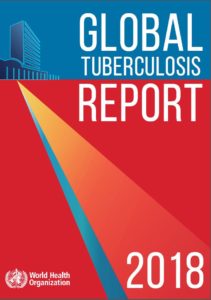Burden of TB in Nigeria weighs heavier, new data shows
This article is more than 4 years old
In its April 2019 article “The tuberculosis enigma”, Nigeria’s the Nation newspaper quotes the World Health Organization as saying the country is “first in Africa” for the burden of the disease.
(Note: We did not find any statement on Nigeria’s ‘first’ ranking in the WHO report cited. But the numbers do support its premise.)
Nigeria is also on a list of 30 countries estimated to have the most new TB cases and highest rates of infection in the WHO’s 2018 global tuberculosis report.
Tuberculosis is one of the world’s top 10 causes of death, and the leading cause of death from a single infectious agent – ahead of HIV/Aids, the WHO report says.Number of cases in Nigeria
But how many people does TB affect in Nigeria? When Africa Check looked at a similar claim in May 2018, we found that the best estimate for Nigeria’s new and relapse (or “incidence”) TB cases was 407,000.
This data was from the WHO’s 2017 global tuberculosis report. In countries with strong health systems, the number of cases reported to authorities are used to count incidence. In those with weaker systems, the WHO tries to work out how many cases of TB are not reported.
The WHO’s 2018 TB report says Nigeria now has a best estimate of 418,000 new and relapse cases. The newer data is from 2017.
Nigeria’s number of TB cases could be as low as 273,000 or as high as 594,000, the UN agency said.
Only five other countries had more cases: India (2.74 million), China (889,000), Indonesia (842,000), the Philippines (581,000) and Pakistan (525,000).
In 2017, 84% of the world’s 10 million new TB cases were in only 30 countries. TB caused the deaths of an estimated 1.3 million HIV-negative people, and 300,000 deaths of HIV-positive people.
The TB report says underdiagnosis is still a major challenge in Nigeria.
In 2018 the country set aside a reported US$409 million to fight the disease. But more than three-quarters of this is unfunded. The WHO also says the amount is $312 million short of what is needed.
(Note: We did not find any statement on Nigeria’s ‘first’ ranking in the WHO report cited. But the numbers do support its premise.)
Nigeria is also on a list of 30 countries estimated to have the most new TB cases and highest rates of infection in the WHO’s 2018 global tuberculosis report.
Tuberculosis is one of the world’s top 10 causes of death, and the leading cause of death from a single infectious agent – ahead of HIV/Aids, the WHO report says.
Number of cases in Nigeria
But how many people does TB affect in Nigeria? When Africa Check looked at a similar claim in May 2018, we found that the best estimate for Nigeria’s new and relapse (or “incidence”) TB cases was 407,000.
This data was from the WHO’s 2017 global tuberculosis report. In countries with strong health systems, the number of cases reported to authorities are used to count incidence. In those with weaker systems, the WHO tries to work out how many cases of TB are not reported.
The WHO’s 2018 TB report says Nigeria now has a best estimate of 418,000 new and relapse cases. The newer data is from 2017.
Nigeria’s number of TB cases could be as low as 273,000 or as high as 594,000, the UN agency said.
Only five other countries had more cases: India (2.74 million), China (889,000), Indonesia (842,000), the Philippines (581,000) and Pakistan (525,000).
Not enough people correctly diagnosed
In 2017, 84% of the world’s 10 million new TB cases were in only 30 countries. TB caused the deaths of an estimated 1.3 million HIV-negative people, and 300,000 deaths of HIV-positive people.
The TB report says underdiagnosis is still a major challenge in Nigeria.
In 2018 the country set aside a reported US$409 million to fight the disease. But more than three-quarters of this is unfunded. The WHO also says the amount is $312 million short of what is needed.

Add new comment